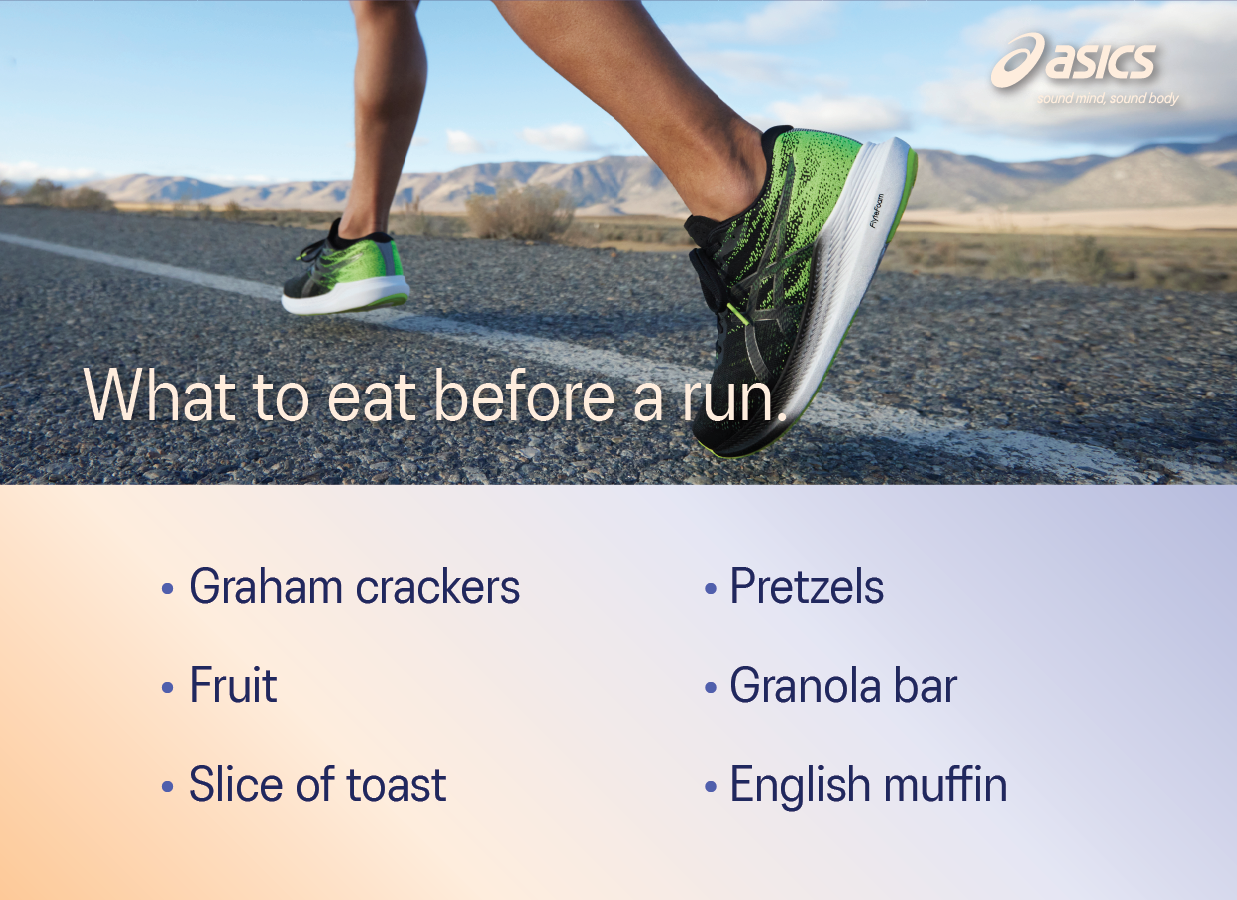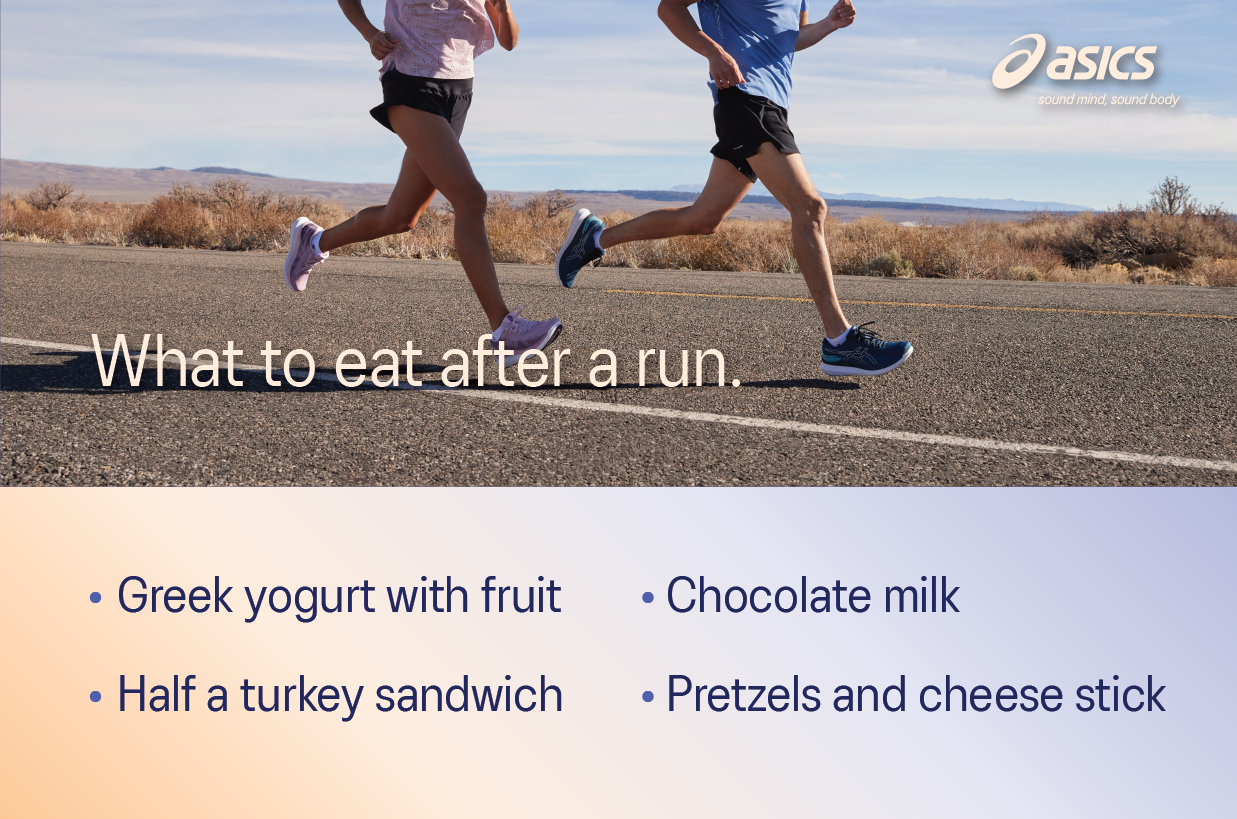
What to Eat Before, During, and After Running
September 1, 2022 / ASICS Australia
From marathon runners to club runners to weekend warriors, we all run differently—with different fitness goals, running styles, strides and shoes.
As different as we may be as runners, there is one thing we all have in common... We all eat.
What we eat, when we eat, and how we eat can all positively or negatively affect our runs... no matter which type of runner you are. ASICS sat down with renowned nutritionist and accomplished runner Meghann Featherstunn to talk all things running nutrition. From marathon runners who need complex carbs to sustain their long distances to the 5k runners who need quick-burn energy sources, Meghann helped us understand some concepts that all types of runners can benefit from when it comes to nutrition and running goals.
Creating a running nutrition plan to support your goals
Nutrition is a big, wide topic that covers a lot of areas, but it doesn’t have to be complicated when it comes to running. And sure, it goes beyond fruit, vegetables and watching your sweets and salts, but there’s really just one main goal: It should be supportive of our goals – in both running and life.
Giving your body the fuel it needs, when it needs it, can be the difference between energetic, enjoyable runs and fatigued, frustrating ones. By identifying your goals and doing some planning, you can fuel your body and your running routine.
What to eat before running

While every runner is different, there are a few common rules you can follow to ensure you have the proper nutrition to fuel your run. What you can eat depends on the type of run you’re planning:
What to eat before a shorter run (6 kilometers or less)
When it comes to shorter runs like 5k, there are two general rules to follow:
- If it’s been less than three hours since your last meal, there’s no need to eat before you run, thanks to a form of glucose called “glycogen.” Glycogen comes from eating carbohydrates and is your body’s most easily accessed source of energy. If you’ve eaten within three hours, you should have enough glycogen still stored in your muscles to sustain your energy.
- If it’s been more than three hours since your last meal, eat a snack. If you are hungry, eat a snack. If you aren’t sure... eat a snack. Smaller snacks packed with simple carbs are your ideal option before heading out for a run. Your pre-run snack should be something that provides quick energy to your body and does not weigh you down and isn’t a three-course meal.
Examples of quick energy snacks to eat before a shorter run are:
- Graham crackers
- Fruit
- A slice of white toast (whole-grain contains complex carbs and is better suited for longer runs)
- Pretzels
- A granola bar
- An English muffin
What to eat before a longer run (more than 6 kilometers) or speed training
Longer runs and speed training require a more sustained energy burn. In order to fuel your body for these types of runs, replenish your glycogen stores by eating 50-60 grams of complex carbs approximately one to two hours before you lace up.
Complex carbs contain minerals, vitamins and fibers that take longer to absorb and digest. When compared to simple or refined carbohydrates, they're better for a more sustained energy throughout your run.
These foods are packed with complex carbohydrates. Keep them in mind when planning your longer and speed training runs:
- Whole grain bread or English muffins
- Brown rice
- Quinoa
- Autumn vegetables like sweet potatoes or squash
- Oatmeal
- Berries
- Bananas
- Melons
What not to eat before running
While there are plenty of foods that can help with energy and endurance during your run, there are others that can hurt your performance. Much like the three-course-meal example mentioned earlier, some of the following examples of what not to eat before a run may seem common sense.
- Foods heavy in fat and protein can lead to cramping and fatigue
- Spicy and high-fiber foods can cause gastrointestinal upset. Some examples of high-fiber foods are fruits with skin like apples and pears, legumes, nuts and most beans and vegetables like artichokes, cauliflower and broccoli
- Caffeine in coffee, tea and other forms can result in an elevated heart rate and more bathroom breaks
- Alcohol is detrimental to running in many ways: it’s dehydrating; it’s a diuretic; it can affect coordination and balance; and it is a depressant, which can slow down overall performance
How long after eating can you run?
It is recommended that you wait 3-4 hours after a large meal before running, whether you’re lacing up and hitting the road or trail or track. A small meal or a snack calls for at least a half-hour wait, but preferably a 1–2-hour window is best for both digestion and to allow your glycogen stores to replenish.
Keep in mind that everyone is different, and that what works for you may not necessarily work for someone else. Try to wait at least the minimum suggested time before running, but after that, trial and error may be the best way to figure out what works for you.
Should you eat or drink during a run?
If you’re planning on running for less than 60 minutes, make sure you head into your run well hydrated and well fueled. If so, you do not need to take anything with you. If your run is over 60 minutes, you’ll want to carry fluids – either water or a sports drink – if it is warm or if you are a heavy sweater. If your run is over 90 minutes, make sure to carry an electrolyte drink and gels, chews or foods like applesauce or dried fruit.
What to eat after a run

Your run isn’t done until you’ve refueled to recover. Ideally, you’ll want to eat a balanced meal with adequate carbohydrates, protein and colorful fruits and/or vegetables within 1-hour after running to help restore, rebuild and replenish the glycogen in your muscles. If a full-on meal is not possible, a snack with carbohydrates and protein to tide you over until a meal is a great idea. Examples of sustaining and refueling snacks to help you refuel after a run until you can hit all the other food groups can be:
- Greek yogurt with fruit
- Half a turkey sandwich
- A glass of chocolate milk
- Pretzels or a cheese stick
4 tips for the everyday runner’s diet
If you’re heading out for a run every day, the following tips are helpful in maintaining proper nutrition and hydration. Putting these into practice will help to ensure that you’re getting the most out of your runs:
1. Stay hydrated throughout the day
Fluid needs can vary dramatically depending on the weather. Hot, humid days will call for a higher level of liquid intake, when cooler, less humid days will not. Remember that your sweat is made up of both water and sodium. Using electrolyte-rich drinks is a good way to replace lost sweat, as they contain both (whereas water does not). All fluids—tea, juice, etc.—count towards your (re)hydration except for alcohol.
2. Eat balanced meals and snacks every 3 – 4 hours
As runners, our bodies respond best to consistent fueling throughout the day. That said, you should strive to give your body the energy it needs when it needs it. Listen to your hunger cues and respond with balanced snacks and meals.
A runner’s meal should include a balance of enough protein (20–40 gm of protein per meal), an adequate amount of carbohydrates and plenty of color from fruits and vegetables.
3. Time your nutrition around your run
We run our best when we have fuel readily available to our muscles. Giving your body the fuel it needs before you run will help you get the most out of your exercise both physically and mentally. As mentioned, eating a meal 2-3 hours pre run, a snack within 1-hour pre run and a recovery meal or snack 1-hour post run is the advised timetable for optimum performance.
The time of day you choose to run is also important to the goals you’re hoping to achieve. Did you know that factors such as core body temperature, hormone levels, breathing capacity, reflex, strength, and energy stores change depending on the time of day? Check out this article from the “Running for Life” topic on medium.com for an in-depth look at how the time of day should align with your running goals.
4. Listen to your body and learn what you need to feel your best
Regardless of any sports nutrition recommendations, listening to your body’s signals is most important. If you are hungry, eat. If you are tired, rest. If you are thirsty, drink. Don’t lose sight of the things your body is trying to tell you. As you begin to run more miles, learning to eat, drink and rest without waiting for body signals will become a habit. Learn what your body needs and when to provide those things to help you feel your best daily.
Track your running diet to reassess and adjust
There’s a lot of information in this article to digest and a lot of concepts to grasp in relation to your own body, goals and running style. Our best advice: Incorporate small parts of what you’ve learned into your routine and track how they affect your body and your run. Once you’ve determined the best snack for you to eat before a run, then you can add in another piece of the puzzle like which type of running shoe best suits your gait and pronation . Little by little, you’ll be able to hone in on a diet, a routine and the equipment that works best for you. Just remember... it’s a marathon, not a sprint.
For more tips on nutrition for running, follow sports dietitian and runner Meghann Featherstun.
About the author
Meghann Featherstun is a registered dietitian nutritionist, sports dietitian, and sub-3-hour marathoner. She holds a master’s degree in Nutrition from Case Western Reserve University in Cleveland, Ohio, where she first dove into sports nutrition at the collegiate level. For the last five years, she has worked with hundreds of runners to help them fuel their optimal daily and performance nutrition through her business Featherstone Nutrition.
Please note: This blog is not intended to be a substitute for professional medical advice, diagnosis, or treatment. Always seek the advice of your physician or other qualified health provider with any questions you may have regarding a medical condition and before beginning any diet or exercise program.